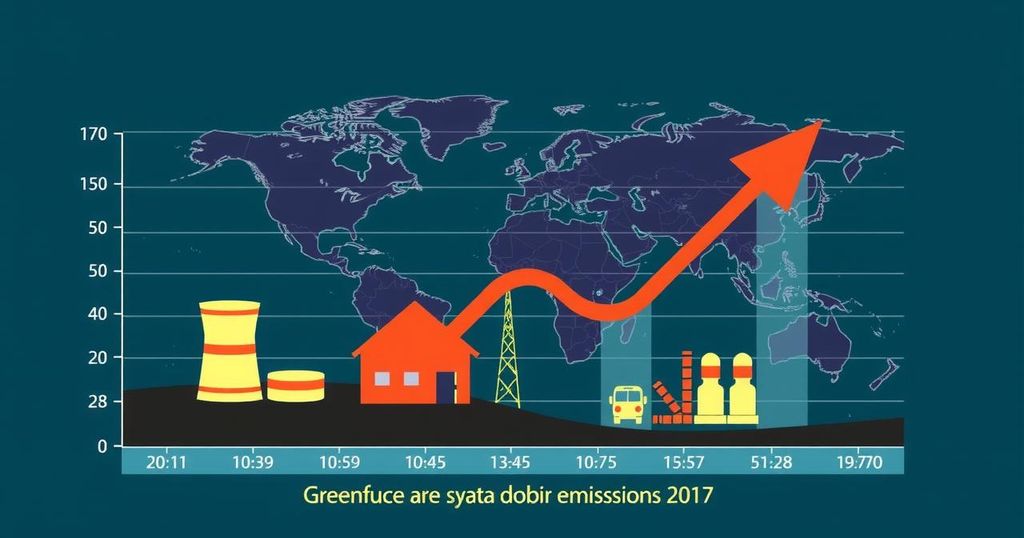India has achieved a 7.93% reduction in greenhouse gas emissions from 2019 to 2020, as reported in its fourth Biennial Update Report (BUR-4) to the UNFCCC. The reduction highlights the country’s commitment to reaching net-zero emissions by 2070, primarily driven by initiatives in the energy sector and afforestation, showcasing a proactive approach towards achieving climate resilience while ensuring sustainable development amid significant challenges.
In response to the growing threats of climate change, India has made significant strides in reducing greenhouse gas emissions, achieving a 7.93% reduction in total GHG emissions in 2020 compared to 2019. This accomplishment was documented in India’s fourth Biennial Update Report (BUR-4) submitted to the United Nations Framework Convention on Climate Change (UNFCCC). Notable is the largest contributor to emissions being the energy sector, responsible for 75.66% of emissions, paired with successful initiatives in afforestation and sustainable urban planning contributing to this reduction.
India’s ambitious pledge to reach net-zero emissions by 2070 was made during the 26th Conference of the Parties (COP 26) held in 2021, emphasizing the country’s commitment to a sustainable, climate-resilient future. This commitment is backed by strategic frameworks to transition to low-carbon development across various sectors including energy, urban design, and industry. The implementation of various climate action initiatives showcases India’s proactive approach to addressing environmental challenges, ensuring development remains in harmony with ecological sustainability.
Moreover, India’s unique circumstances necessitate adaptation strategies that consider its large population and developmental needs. Although India contributes only 4% to global cumulative GHG emissions, the urgency to develop sustainably while addressing climate vulnerabilities is evident. Policies promoting energy efficiency, comprehensive air quality management, and coastal ecosystem conservation illustrate coherent climate action aimed at fostering resilience against climate impacts.
As part of its broader initiatives, the government has launched programs focusing on tree plantation and afforestation, alongside urban climate adaptation efforts, signaling its dedication to enhancing green cover and reducing carbon footprints. One exemplary initiative is the Miyawaki tree planting method utilized at the Mahakumbh 2025, blending environmental responsibility with cultural practices.
In summary, India’s coordinated efforts in reducing GHG emissions and pursuing sustainable development exemplify its commitment towards mitigating climate change. The country continues to evolve its strategies to ensure balanced growth, reflecting a determination to achieve carbon neutrality while nurturing its ecological heritage.
Climate change remains a profound challenge globally, necessitating immediate action to mitigate its effects. The United Nations Framework Convention on Climate Change (UNFCCC) stipulates that participating nations must articulate their carbon reduction goals through Nationally Determined Contributions (NDCs), especially under the Paris Agreement. India, recognized for its commitment to sustainable development, has pledged to attain net-zero emissions by 2070 and details its progress through Biennial Update Reports submitted to the UNFCCC. These reports not only delineate emission reduction statistics but also discuss mitigation actions and enhancements in environmental governance.
India’s recent achievement of a 7.93% drop in GHG emissions signifies a pivotal step in its journey toward a sustainable and low-carbon future. Through effective policies, strategic planning, and community engagement, India exemplifies how nations can align their growth trajectories with climate resilience. The ongoing commitment to reducing emissions while addressing developmental needs reflects the fundamental principle of equity central to the Paris Agreement. As India navigates its path to net-zero by 2070, it sets a commendable example for other nations seeking to balance economic development with climate responsibilities.
Original Source: pib.gov.in






